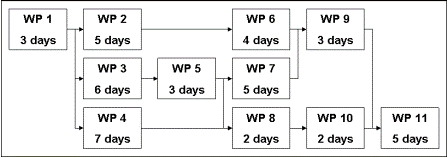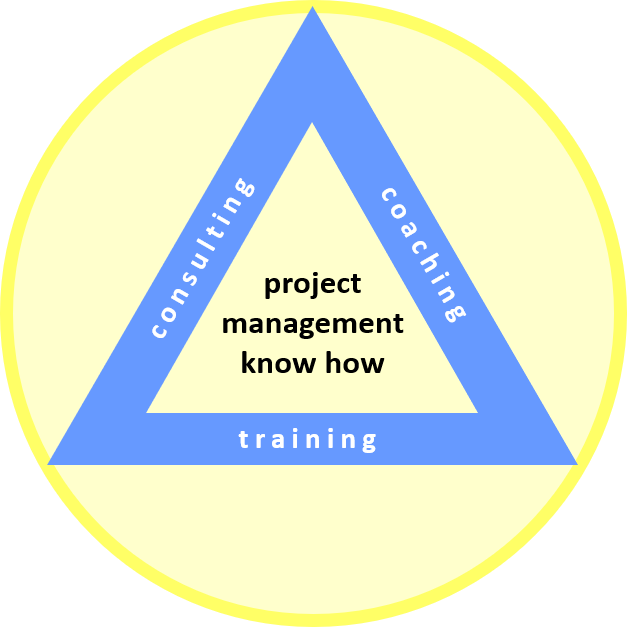FINAL TEST
This final test consists of 13 questions covering the five lessons of
the course. After completing it, we ask you to give us feedback for the
whole course. Then, you can display and print out a certificate with
your result. You can run through all the questions as often as you like.
However, once you press that button "generate certificate" at the
bottom of this page your given answers will be evaluated, a new window
with your certificate including your final test score will open and all
the input fields of the questions will be reset.
Online Project Management Course
Final Test
Question 1: What differentiates a project from routine activities?
- (A) A project consists of work packages in order to create a result described in terms of scope.
- (B) A project creates a unique result in terms of scope, schedule, and budget.
- (C) A project follows a time schedule under the constraint of a given budget.
- (D) A project creates a result based on a set of SMART goals.
Question 2: Which of the following statements are correct?
Question 3: Which one of the following statements is not correct?
- (A) If we change the scope of a project its schedule and budget might change.
- (B) If we decrease a project's total duration its total cost might increase.
- (C) If we increase a project's budget its scope might have been increased.
- (D) If we increase the scope of a project its goal must have been changed.
Question 4: What could be an acceptable definition of the term "project stakeholder"? A project stakeholder is an individual or an organization who ...
- (A) plans and manages the project scope and its budget.
- (B) controls necessary changes in implementation phase.
- (C) has interest in or is affected by the project work or its results.
- (D) declares preliminary and final acceptance of the project results.
Question 5: Given the following goal definition, which aspect is missing?
"Design and build a two-car garage, 6 m x 7 m x 2.5 m, with concrete foundation, pre-fab walls and roof, extra back door to the garden, within a budget of USD 12,000.--"
- (A) Specified
- (B) Measurable
- (C) Realistic
- (D) Timed
Question 6: What is our preferred tool of planning the project scope?
- (A) Product Breakdown Structure
- (B) Work Breakdown Structure
- (C) Network Diagram
- (D) Gantt Chart
Question 7: Given the following network diagram, what is the total duration of that project (in days)?

Question 8: Referring to the network diagram of question 7, what is the critical path?
- (A) 1 - 3 - 5 - 7 - 9 - 11
- (B) 1 - 2 - 6 - 9 - 11
- (C) 1 - 4 - 7 - 9 - 11
- (D) 1 - 4 - 8 - 10 - 11
Question 9: How can we prioritize risks of a project?
- (A) By estimating the probabilities of the risks.
- (B) By multiplying probability and impact of each risk and comparing the results.
- (C) By estimating the impact of each risk.
- (D) By adding the cost of preventive and corrective actions of each risk and comparing the results.
Question 10: Controlling tools help to ...
- (A) ... change the project plan.
- (B) ... compare planned results with requirements.
- (C) ... compare actual results with planned results.
- (D) ... change requirements or specifications.
Question 11: We refer to the network diagram of question 7. Would the whole project be delayed if we found ...
Question 12: After risk identification and analysis we decided to integrate preventive actions for event X. In implementation phase this event X occurs. What consequences will we usually have?
- (A) No time delay, no additional cost.
- (B) Time delay, but no additional cost.
- (C) No time delay, but additional cost.
- (D) Time delay and additional cost.
Question 13: In your lessons learned workshop you find that unexpected events caused additional cost in your project. What are you going to do?
Please give us your feedback for this course. Your comments are welcome.
In order to generate your personalized certificate we need your first name and last name. We do not store these data.
Finally, you can evaluate the final test and generate your certificate for this course. (Pressing this button opens your certificate in a new window and resets all input fields of the final test.)
Return from Final Test to Home Page
|
|
|

Your Comments
Have your say about what you just read! Leave me a comment in the box below.